Leading others equals serving others
Klar Leadership Academy students discover what makes a good leader
by Laurie B. Davis
Why would I want to follow you?
This question is posed to a select group of University of Toledo students learning about what it means to lead and how to differentiate between good leaders and ineffective leaders.
Leadership development taught through the Klar Leadership Academy within the College of Business and Innovation challenges students to see the big picture and to think of leadership as an opportunity to serve others. These aspirations align with the very mission of UT to educate “a diverse community of leaders committed to improving the human condition in the region and the world.”
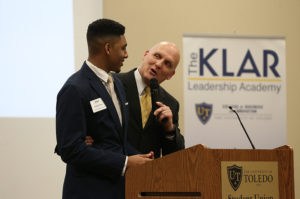
A servant-leadership strategy delivers a win-win outcome. When the staff members within a company excel in their work because the company’s leaders support their success, the employees and the CEO win. “That’s one of the foundational pieces that the program is built on,” says Longenecker about the Academy experience. “Hearing that early in their lives is gigantically important for our students. Hearing that message from the mayor, successful entrepreneurs and seasoned CEOs, is a really big deal. For them to hear that their success is predicated on them helping other people be successful is a game changer in their leadership development. And that line of thinking is something that you don’t see enough of in a lot of companies or leadership development initiatives,” adds Longenecker.
Alexandria Hetzler, a senior who is studying Organizational Leadership and Management and is a current member of the Klar Leadership Academy, says she believes a good leader should be flexible. “I think that a good leader needs to be adaptable. Without a willingness to listen and change as they go along, they have no opportunity to learn or improve.”
Accelerated training
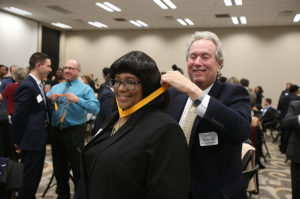
“We try to build out a very focused curriculum because we don’t have a lot of time to do this,” says Longenecker. “They have to roll up their sleeves and work at being the best people they can possibly be. So, we’re pushing the bar up on their character and their decision-making and their leadership acumen.”
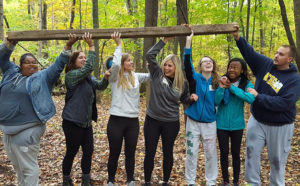
On the weekend of Sept. 15, Camp Miakonda in Toledo provided a retreat environment in which the Academy students could do some self-analysis, work together in teams and simply become better acquainted with each other. “They were spending time with people they wouldn’t ordinarily spend time with and were breaking out of their comfort zones by intermingling with students they don’t know,” says Longenecker. A three-hour Copes/Ropes Course that takes place in the middle of the woods and is cell-phone free may seem similar to the challenges designed for wilderness-based reality show contestants, and in some ways, it is. The physical skill needed to get through this obstacle course relies on the assistance of teammates.
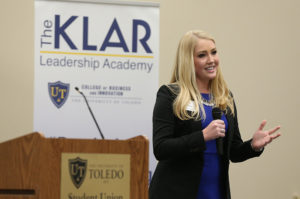
While at the camp, the students also had a few visitors from UT’s alumni community. “They were with the mayor this past weekend. They were with a fellow by the name of Dave Wolf, who is an alumnus and is the North American president of a Swedish chemical company called Perstorp. He’s a world traveler and a two-time graduate of the University of Toledo,” says Longenecker. “We try to tie our graduates back into the Academy. We’re not just talking about people being hugely successful, but here is example, after example, after example. Our mayor went to our Law School. Dave Wolf went through our MBA program. Another visitor was Matt Aston (Bus ’99), who is president of the exceptionally successful Ground Penetrating Radar Systems, an entrepreneurial enterprise founded in 2001 and headquartered in Toledo,” adds Longenecker.
“I think this really changes kids’ confidence levels,” says Longenecker. “They see ‘UT is a good place’ and ‘I can do anything. This school is awesome. Look what these people are doing out here. They’re alums. We can compete with anybody.’”
Privileged access
Trevor Cox (Bus ’16) graduated from the first Klar Leadership Academy class in 2015. His opinion of the Academy experience echoes that of the many students’ whose testimonials fill the program’s website. “The main aspects or components that really stood out about the Klar Leadership Academy were the impactful speakers and the fun interactive events,” Cox wrote in an email. “The fact that these speakers took time out of their busy schedules to help influence us as leaders, really says a lot about their character as leaders in Toledo.
“What makes this academy special compared to other programs is the hands-on experience all the students gained from practicing servant leadership in the community and from attending professional workshops. Overall, this program was powerful, and I personally believe it will continue to make an impact in students’ professional and personal lives.”
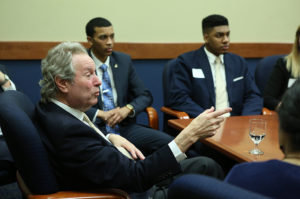
Now in its third year, the leadership academy has proven itself as a success. “I like the tone of the program and the quality of the student population,” says Klar. When the Academy first began, he wondered how the program was recruiting the “cream of the crop” top UT students. Klar says when he saw that professors and academic counselors were giving students recommendations, he realized the program’s potential to shape the next generation of leaders. “Students have shown me they’re really interested in being a part of this.”
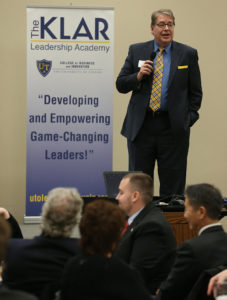
Longenecker loves giving students the chance to interact with Klar whenever he visits—such as Klar did this past February for the 2016-17 class graduation—but also via frequent phone calls. Recently, six students got to interact with Klar on a conference call in Longenecker’s office. “I allow students to volunteer for this interaction so they can benefit from having time with him. He coaches them, telling them to think big, don’t be afraid to take risks, you can do anything you set your mind to do.” Klar says he stays connected to the program through these monthly talks with students and advises them on ways to build on their leadership qualities.
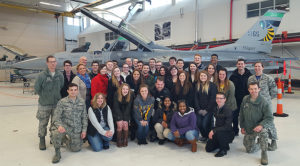
Transformational experiences
“We give them formal instruction, awesome networking opportunities, the opportunity to interact with senior leaders from a wide spectrum of organizations, and then we take them places and expose them to cool things, like when we take them out to the 180th Ohio Air National Guard Base to talk to the commanding officer, to stand in the flight line and see planes take off, eat with the crews who do maintenance on them. To be there with the people who are the avionic specialists to talk about, as a team, how they keep these planes flying,” explains Longenecker.
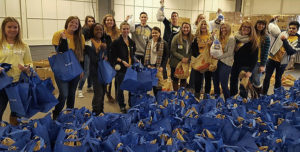
Klar says he is always impressed with the students’ drive and output during a Feed My Starving Children event. “It’s gratifying to me and it’s exhilarating to them,” to accomplish this task. The results of the Klar Leadership Academy illustrate the program’s value. “The leaders of tomorrow are coming out of it,” Klar says.
“At the end of the day,” says Longenecker, “this is really about helping our terrific students see a bigger picture. They begin to realize their behavior, attitude and energy can have a transformational effect on other people if they know how to channel it. So, what we’re doing is teaching our young people how to think bigger, how to know themselves, and how to take control of their lives, and in doing so, they’re going to be in a better spot to go out and change the world and improve the human condition, which is our UT mission.”






